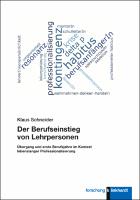Der Berufseinstieg von Lehrpersonen
Übergang und erste Berufsjahre im Kontext lebenslanger Professionalisierung
| dc.contributor.author | Schneider, Klaus | |
| dc.date.accessioned | 2021-06-14T12:13:39Z | |
| dc.date.available | 2021-06-14T12:13:39Z | |
| dc.date.issued | 2021 | |
| dc.identifier | OCN: 1303426874 | |
| dc.identifier.uri | https://library.oapen.org/handle/20.500.12657/49545 | |
| dc.description.abstract | In this dissertation, the phases of training, the immediate entry into the profession (induction phase with mentoring) and the further first professional practice of teachers are examined primarily from the perspective of the professional biographical approach (Keller-Schneider & Hericks 2014). The research goal is to identify conditions necessary for both a successful career start and further career development. After grounded theory (Strauss & Corbin 1996), cluster analysis (Buber & Kraler 2000) and qualitative content analysis (Kuckartz 2016), interviews with school leaders and young professionals are analyzed and interpreted using a multimethodological approach. The empirically gained concept is constituted as professionalization through gaining competence, the professional habitualization is established as a way to success. The Habitus concept according to Bourdieu (2015b) with the triad of perception, thinking and acting is at the center of this work and meets the phenomena of uncertainty and contingency (Paseka et al. 2018) with the creative dimension of generating any number of action schemes for any number of situations. The work concludes with the prospect of concrete implementation options for the knowledge gained in the training and further education curricula. | en_US |
| dc.language | German | en_US |
| dc.subject.classification | thema EDItEUR::J Society and Social Sciences::JN Education::JNM Higher education, tertiary education::JNMT Teacher training | en_US |
| dc.subject.other | Contingency, continued professional development, curriculum, habitualization, induction phase, mentoring, professional habitus, professionalization, teacher training, uncertainty, Teaching Profession, Mentoring, Habitus, Professionalism, Empirical Investigation, Headmaster, Teacher Training, Habitualization, Induction, Contingency, School Type, Teacher Training, Professional Practice, Professional Biography, Practice, Transition Study – Profession, Professional Teacher Training, Curriculum, Pierre Bourdieu, Grounded Theory, Cluster Analysis, Qualitative Research, Interview, Austria, Teacher, Professionalization, Professional Entry, Teaching Profession, Mentoring, Habitus, Professionalism, Empirical Investigation, Headmaster, Teacher Training, Habitualization, Induction, Contingency, School Type, Teacher Training, Professional Practice, Professional Biography, Practice, Transition Study – Profession, Professional Teacher Training, Curriculum, Pierre Bourdieu, Grounded Theory, Cluster Analysis, Qualitative Research, Interview, Austria, Lehrer, Professionalisierung, Berufseintritt, Berufsanfänger, Lehrberuf, Mentoring, Habitus, Professionalität, Empirische Untersuchung, Schulleiter, Lehrerausbildung, Habitualisierung, Induktion, Kontingenz, Schulform, Lehramtsstudiengang, Lehrerbildung, Berufspraxis, Berufsbiografie, Praxis, Übergang Studium - Beruf, Profession, Lehrerfortbildung, Curriculum, Bourdieu, Pierre, Grounded Theory, Clusteranalyse, Qualitative Forschung, Interview, Österreich | en_US |
| dc.title | Der Berufseinstieg von Lehrpersonen | en_US |
| dc.title.alternative | Übergang und erste Berufsjahre im Kontext lebenslanger Professionalisierung | en_US |
| dc.type | book | |
| oapen.abstract.otherlanguage | Im vorliegenden Buch werden Gelingensbedingungen für einen erfolgreichen Berufseinstieg als Lehrperson rekonstruiert. Der Übergang mit den pädagogisch-praktischen Studien als Vorbereitung und der Induktionsphase als folgende und erste berufliche Professionalisierungsphase wird fokussiert, wobei der begleitende Mentoring-Prozess besondere Berücksichtigung findet. Das Habituskonzept (Bourdieu) mit der Trias wahrnehmen – denken – handeln bildet mit der Integration der Resonanz-Diskussion (Rosa) und dem Kontingenz-Phänomen die theoretische Grundlage bzw. die Kernidee der Rekonstruktion: Habitus als Konzept der Professionalität. Die Datengrundlage der empirischen Arbeit besteht aus Interviews mit 25 BerufsanfängerInnen und 15 SchulleiterInnen, die multimethodisch nach der Grounded Theory, der qualitativen Inhaltsanalyse und einer Clusteranalyse qualitativ untersucht werden. Die Arbeit schließt mit dem Ausblick auf konkrete Umsetzungsmöglichkeiten der gewonnenen Erkenntnisse in Curricula für LehrerInnenaus- und -fortbildung. (DIPF/Orig.) | en_US |
| oapen.identifier.doi | 10.35468/5865 | en_US |
| oapen.relation.isPublishedBy | 9a084ee3-3f86-4be2-81d6-89c9fbc5f173 | en_US |
| oapen.relation.isbn | 9783781524262 | en_US |
| oapen.pages | 216 | en_US |
| oapen.place.publication | Bad Heilbrunn | en_US |
| oapen.remark.public | Funder name: Pädagogische Hochschule Tirol |

